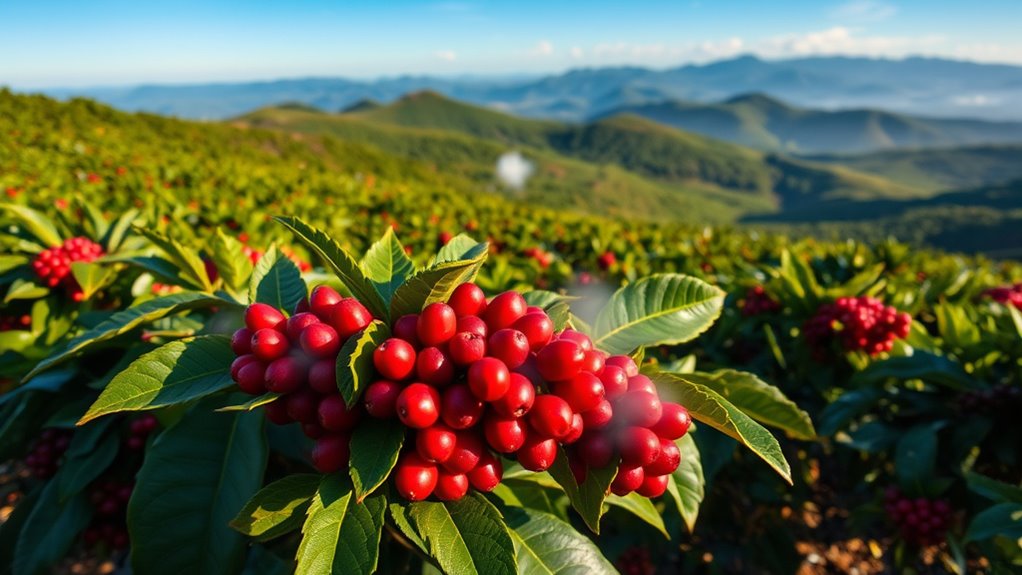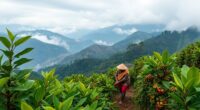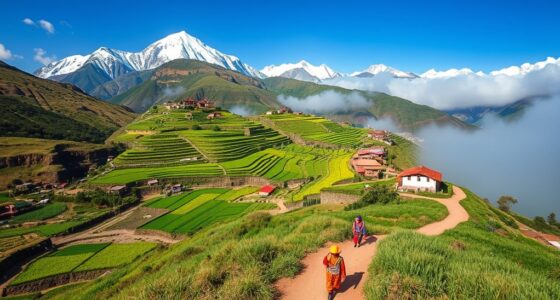Brazil’s coffee regions like Cerrado and Sul de Minas are known for sustainable farming practices that produce high-quality beans. These areas focus on environmentally friendly methods such as shade-grown coffee, water conservation, and integrated pest management. Certifications like Rainforest Alliance and Fair Trade help guarantee fair wages and ecological preservation. By choosing coffee from these regions, you support responsible cultivation and ethical labor practices. Keep exploring to discover how these regions impact your coffee experience.
Key Takeaways
- Cerrado and Sul de Minas are prime Brazilian coffee regions known for high-quality, sustainably farmed beans.
- These regions benefit from favorable climates, soil, and certification programs promoting eco-friendly practices.
- Sustainable farming methods like shade-grown coffee and water conservation are widely adopted in these areas.
- Certifications such as Rainforest Alliance and Fair Trade ensure ethical labor practices and environmental preservation.
- Supporting coffee from Cerrado, Sul de Minas, and beyond promotes responsible consumption and a sustainable supply chain.

Ever wondered what makes Brazilian coffee world-renowned? It all begins with the way it’s cultivated. Brazil has become a leader in sustainable farming practices, guaranteeing that coffee production supports environmental health, preserves local ecosystems, and promotes social responsibility. Many farms participate in coffee certification programs, such as Rainforest Alliance or Fair Trade, which set strict standards for environmental stewardship and fair wages. By choosing coffee with these certifications, you’re supporting farmers who prioritize eco-friendly methods, reduce chemical usage, and maintain biodiversity. This commitment to sustainable farming not only safeguards the land for future generations but also enhances the quality of the beans, giving you a richer, more nuanced cup.
Brazilian coffee’s global reputation stems from sustainable farming, eco-friendly practices, and strict certification standards supporting quality and social responsibility.
In regions like Cerrado and Sul de Minas, the focus on sustainable practices is especially prominent. These areas benefit from climate and soil conditions that allow farmers to grow high-quality beans while adhering to environmentally conscious standards. Coffee certification plays an essential role here, as it helps farmers access premium markets and fairer prices, encouraging them to invest in sustainable techniques. When you buy coffee from these regions, you’re directly supporting a sustainable supply chain that minimizes environmental impact and promotes ethical labor practices. This guarantees that every sip you take is a reflection of responsible cultivation methods, making your coffee experience not just enjoyable but meaningful.
Beyond just certifications, Brazilian farmers are increasingly adopting innovative practices like shade-grown coffee, water conservation, and integrated pest management. These methods aim to reduce the carbon footprint of coffee production while maintaining or improving bean quality. The country’s emphasis on sustainable farming also involves community engagement, where farmers work closely with local populations to improve living standards and promote education about environmentally friendly practices. Additionally, utilizing renewable energy sources in farming operations further reduces environmental impact and enhances sustainability efforts. This holistic approach creates a resilient coffee industry that balances economic growth with ecological preservation, guaranteeing that the iconic Brazilian coffee remains a sustainable product.
As a coffee enthusiast, understanding the significance of sustainable farming and coffee certification can deepen your appreciation for Brazilian coffee. When you look for certified beans, you’re supporting a system that values environmental health, fair labor, and quality. This awareness influences your choices and encourages more farmers to adopt responsible practices, fostering a more sustainable coffee culture in Brazil. Ultimately, your decision to purchase certified, sustainably farmed coffee helps preserve the land, support local communities, and enjoy a cup that truly embodies the rich, ethical roots of Brazilian coffee.
Frequently Asked Questions
How Do Climate Changes Affect Brazilian Coffee Quality?
Climate changes impact Brazilian coffee quality by causing unpredictable weather patterns, which challenge your crop’s stability. You need to focus on climate adaptation strategies to maintain quality, such as selecting resilient coffee varieties and adjusting your farming practices. Drought resilience becomes vital during dry spells, helping you protect your beans from flavor loss and quality decline. Staying proactive guarantees your coffee remains excellent despite the shifting climate conditions.
What Sustainable Practices Are Common Among Brazilian Coffee Farmers?
You’ll find that many Brazilian coffee farmers adopt sustainable practices like pursuing organic certification, which reduces chemical use and benefits the environment. Water conservation is also common, with farmers implementing efficient irrigation systems and rainwater harvesting to protect water resources. These practices not only support the ecosystem but also improve coffee quality. By embracing sustainability, you help guarantee a resilient and eco-friendly coffee industry in Brazil.
Which Brazilian Coffee Regions Are Emerging as New Producers?
You should watch for emerging regions like Espírito Santo, Bahia, and parts of Mato Grosso, where new regional initiatives and emerging farm collaborations are gaining momentum. These areas are investing in sustainable practices, innovative processing, and quality improvements. As a result, they’re becoming notable players in Brazil’s coffee scene, offering unique flavors and expanding the country’s global reputation. Keep an eye on these regions for future coffee breakthroughs.
How Does Altitude Influence Flavor Profiles in Brazilian Coffees?
Did you know that altitude impact substantially shapes Brazilian coffee’s flavor development? When you explore higher elevations, you’ll notice the cooler temperatures slow bean maturation, allowing complex sugars and acids to develop fully. This results in coffees with brighter, more nuanced profiles. So, as you taste Brazilian coffees, consider how altitude impact creates that vibrant acidity and layered complexity, making each cup uniquely expressive of its high-altitude origins.
What Are the Best Brewing Methods for Cerrado Coffee?
You should try brewing Cerrado coffee with a French press or pour-over for the best flavor. The French press extracts rich, full-bodied notes, highlighting the coffee’s natural sweetness. Pour-over brewing emphasizes clarity and bright acidity, showcasing the coffee’s nuanced flavors. Both methods bring out Cerrado’s balanced profile, so choose based on your preferred taste experience. Experiment with grind size and brew time to perfect your cup.
Conclusion
So, savor the stunning specificity of Brazil’s splendid coffee scenes, from Cerrado’s crisp charm to Sul de Minas’ smooth serenity. Embrace the exploration, energize your experience, and elevate your appreciation for this exceptional export. By delving into diverse destinations, you’ll discover a delightful depth of flavor and finesse. Let each sip serve as a stunning symbol of Brazil’s bold, beautiful bounty—bringing your coffee journey to a satisfyingly sophisticated summit.









